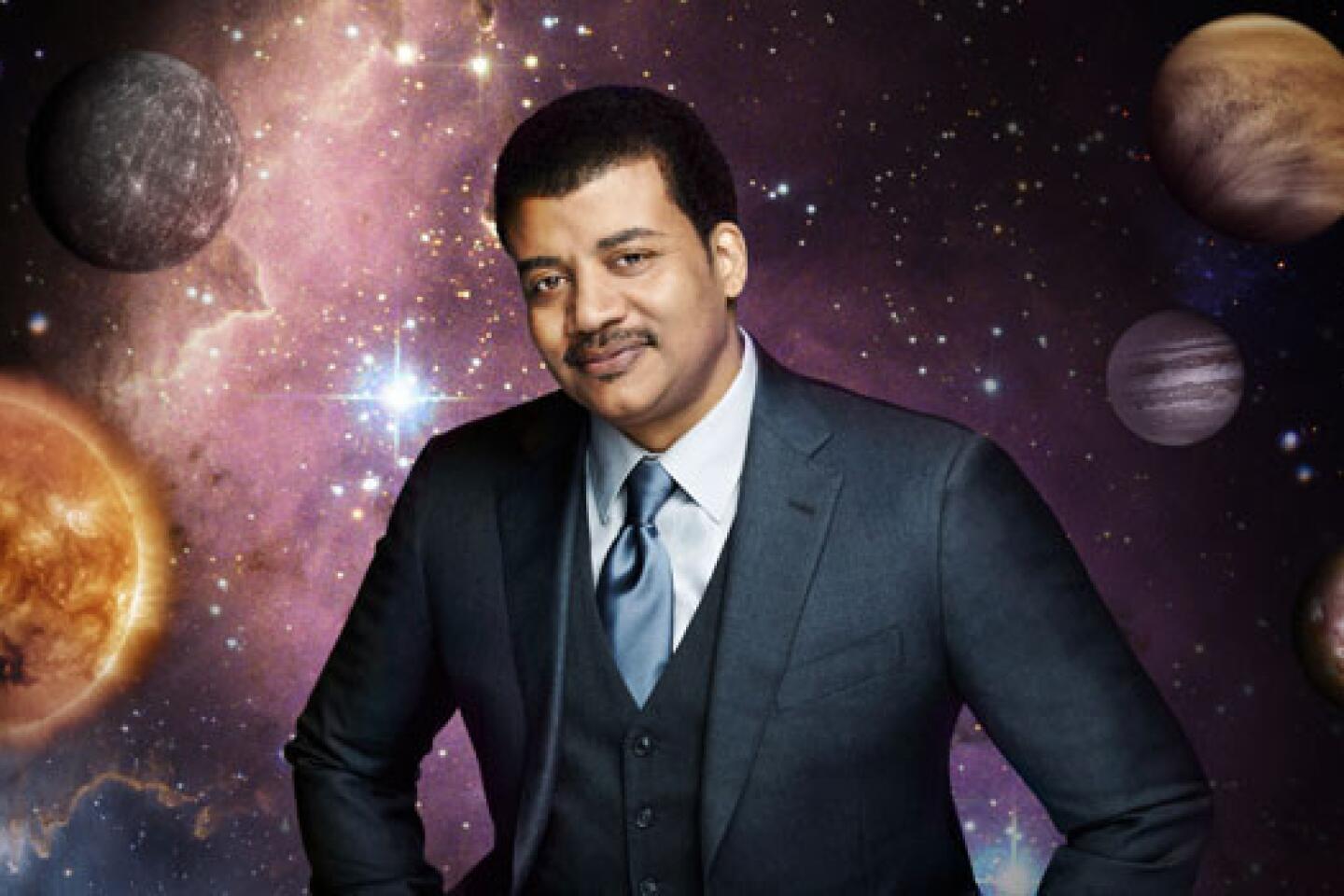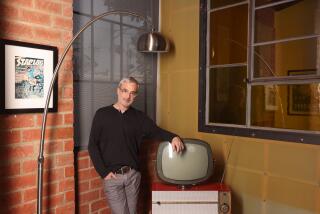‘Cosmos’ recap: Starts with a big bang
Science geeks whipped themselves into a veritable frenzy of anticipation over the weekend for the premiere of “Cosmos,” the much-touted reboot of the classic series created by astronomer Carl Sagan in the 1970s.
You have to understand: Sagan and his original series touched the hearts of millions of people over the years, inspiring new generations of budding young scientists– not to mention “Family Guy” creator Seth MacFarlane, who championed this project from the start. Small wonder the excitement was so palpable; it even inspired a mocking Twitter hashtag, #COSMOSspoilers. (My personal favorite: “Special effects fail during show, so deGrasse Tyson MacGyvers a new universe together to use with Cheetos and silly string.” -- @DrSkySkull)
No doubt there are purists among the die-hard Sagan fans who consider any reboot a heretical act. I’m not one of them. There’s precious little real science on TV anymore, certainly not on the major network channels, so it’s gratifying to see Fox pull out all the stops and give us a big-budget, prime-time science extravaganza with eye-popping graphics and the odd whimsical animation, spearheaded by the affable, engaging astronomer Neil deGrasse Tyson.
BEST TV OF 2013 Lloyd | McNamara
The first segment of the episode covers pretty familiar ground. It’s the old “Powers of 10” trope, a staple of science museums, taking the viewer on a tour through the various size scales of the universe: from Earth, to the solar system, to the Milky Way galaxy, to the super-Virgo cluster and beyond, to the outermost reaches of what we can directly observe. But hey – it’s a popular trope for a reason, and who am I to deny a whole new audience its first taste of shock and awe at the vast expanse of the cosmos?
And Tyson adds a 21st century twist by invoking the multiverse: the notion that our universe might be just a bubble among bubbles in a vast infinite sea of universes. That’s the kind of notion that used to fall firmly into crackpot territory – or make for bestselling science fiction novels -- but is now taken quite seriously by many cosmologists, even if it’s not (yet, if ever) a testable hypothesis. And it’s the perfect set-up to a charming animated sequence relating one of my favorite stories from the history of astronomy.
Giordano Bruno was an Italian mystic who was among the first to adopt the Copernican cosmology at a time when doing so could prove hazardous to your health. In fact, he went one step further and suggested – based on a vision when he was 30, perhaps because he read the forbidden text of Lucretius, “On The Nature of Things” – that the sun and its planets were just one of millions of other solar systems in an infinite universe. It made sense to Bruno. God was infinite, he reasoned, so why shouldn’t the universe he created be infinite too?
PHOTOS: TV shows and their spinoffs
The Catholic Church begged to differ and excommunicated him. So did the Protestant church. In fact, Bruno was hard-pressed to find any sympathetic ear for his message, and we are treated to many scenes of poor Cartoon Bruno being cast out, shivering, into the cold cruel wilderness. But would he keep his mouth shut? No, he would not. Bruno was a True Believer. He was also a bit of a hothead, with a long history of becoming embroiled in disputes wherever he went. In short, Bruno was not a people person. That and his stubborn refusal to recant his weird beliefs eventually got him imprisoned, tortured and burned at the stake.
But as Tyson points out, the dude was right. Sure, it was a lucky guess, and he wasn’t really a scientist, but “It gave others a target to aim at, if only to disprove it.” And just 10 years later, Galileo looked through his telescope and saw the moons of Jupiter, and our view of the universe would never be the same.
The Bruno sequence was hands down my favorite part of the episode, a fresh take on what was, to me, a familiar story. Now I want to see an entire animated series that just tells stories of famous scientists throughout the ages, with all the accompanying melodrama and gory details. I‘m thinking an edgy, “Family Guy” kind of vibe would be just the thing. Get on that, Seth MacFarlane. Or give us more of these in future episodes. Thanks.
The next sequence brushes off yet another time-honored trope of science outreach: how to convey not just the vast size of the universe but also its age, spanning 13.7 billion years? Easy – you just scale the entire history of the universe down [to one calendar year, with January 1 marking the Big Bang. The stars would have formed on January 20, and the galaxies a few days later. Our sun didn’t appear until August 31; life on Earth first appeared on September 21. And humans? We didn’t show up until the last hour of the last day, December 31. Our entire history would be contained in the last 14 seconds.
Mind-boggling, to be sure, but this was probably the weakest segment of the episode for me, perhaps because – like the Powers of Ten segment -- it felt so familiar. Yet it also contained that most famous line immortalized by Carl Sagan: “We are made of star stuff.”
Sagan’s memory can’t help but loom large, and the episode wisely opts to end with an homage of sorts. It turns out Tyson actually met Sagan when he was just 14, taking the train out to Cornell University in Ithaca, N.Y., where his idol met him at the station and gave him a tour of the campus. And he signed one of his books for the teen: “For Neil, a future astronomer. Carl.” That, right there, is why Sagan remains one of the most beloved scientists in the public sphere. “I already knew I wanted to be a scientist,” Tyson recalls. What he learned that day from Sagan was “the kind of person I wanted to become.”
Ahem. Excuse me while I get a little verklempt. It was the perfect note on which to end the first episode. And it convinced me that Tyson is a fitting heir to the Sagan legacy. I’ll be eagerly tuning in for future episodes.
ALSO:
Watch ‘Cosmos’ Q&A with Neil deGrasse Tyson and Seth MacFarlane
Review: Neil deGrasse Tyson’s ‘Cosmos’ a fascinating, fun place to be
Seth MacFarlane hopes ‘Cosmos’ counteracts ‘junk science,’ creationism
More to Read
The complete guide to home viewing
Get Screen Gab for everything about the TV shows and streaming movies everyone’s talking about.
You may occasionally receive promotional content from the Los Angeles Times.







